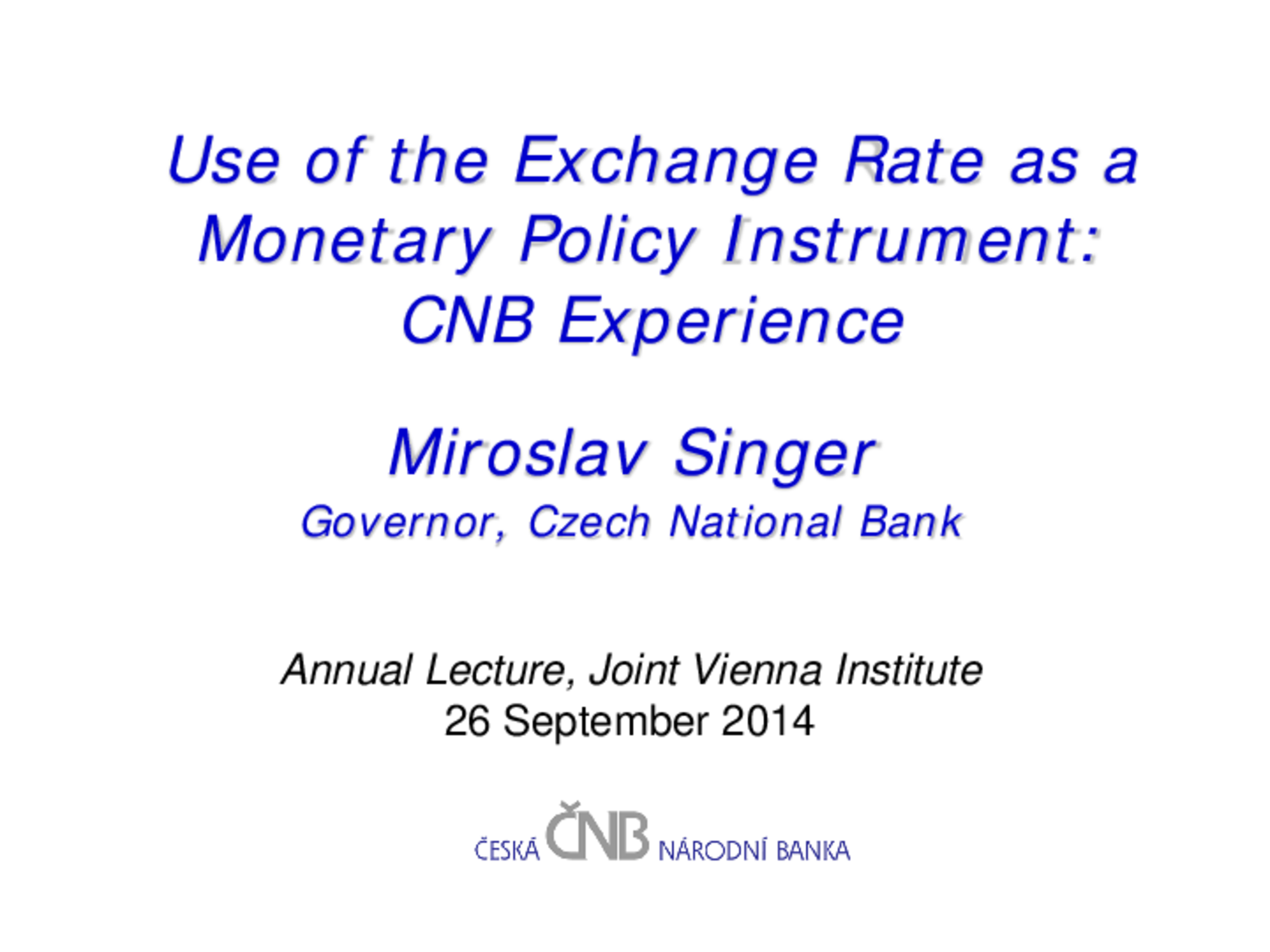Friday, September 26
Presenter
Miroslav Singer, Governor, Czech National Bank
Summary
The Governor of the Czech National Bank (CNB), Mr. Miroslav Singer, delivered this year’s JVI Annual Lecture on September 26, 2014. In introducing Governor Singer, JVI Director Norbert Funke described the Annual Lecture as one of the highlights of the JVI’s annual program to stimulate policy discussions at the highest level. He thanked Mr. Singer for the longstanding and mutually beneficial cooperation between the CNB and the JVI and for the CNB’s continued financial support as one of the JVI’s donors. The Czech Republic, he said, provides a prime example of a successful move from being a recipient of technical assistance and training early in the transition process to becoming an important provider of capacity development services for other countries.
Governor Singer launched his lecture by describing the trajectory of the Czech economy and monetary policy since 2008. During 2013, the Czech Republic experienced strong disinflation and a number of factors—among them decreasing inflation expectations, a large negative output gap, the lowest-ever nominal wage growth, a decline in fixed investment, and the falling growth of monetary aggregates and velocity of money—indicated that the risk of deflation was rising. Because the policy rate had already hit the zero lower bound in late 2012, the CNB repeatedly announced during 2013 that it would use the exchange rate as an additional tool of monetary policy in the Czech inflation-targeting regime should there be a need to further ease monetary conditions.
Governor Singer described how in 2013 the CNB at first conducted oral interventions against the currency, which initially had some impact but whose effectiveness gradually faded over time. In November 2013, the CNB then weakened the koruna by about 6% through official interventions (approximately €7.5 billion) and announced its commitment to prevent excessive appreciation of the currency by setting an exchange rate floor of 27 CZK/EUR. On the weaker side of this floor, the exchange rate was allowed to float according to supply and demand in the foreign exchange (FX) market. In Governor Singer’s view, the FX market quickly adapted to the new exchange rate after only a few days of interventions in early November 2013, and the CNB has not had to intervene since.
The 2013 FX interventions differed in several respects from the interventions the CNB occasionally conducted between 1997 and 2003 in that they became an official instrument of monetary policy to ease monetary conditions, were accompanied by an explicit exchange rate floor, and were far larger. During the earlier period, the CNB intervened either to suppress koruna volatility, especially in the first years of the floating regime, or to correct FX misalignments, especially during 2001–02, when appreciation was becoming excessive.
How was the Czech economy affected by the interventions? A number of indicators from the real economy and the labor market in 2014 suggest that the CNB’s unconventional policies are bearing fruit. The economy is recovering and it appears that inflation may have bottomed out. The CNB forecast of August 2014 expects the GDP to grow at about 3% annually for the next 2-3 years and inflation to move close to the 2% target towards the end of 2015.
There are, of course, risks to the forecast, mainly arising from the sluggish economic recovery in the euro area, the Czech Republic’s main trading partner. However, Governor Singer reaffirmed the CNB’s commitment not to discontinue using the exchange rate as a monetary policy instrument before 2016.
The lecture stimulated a lively discussion that provided a first-hand opportunity to review the CNB experience thus far and discuss the benefits and costs of nontraditional monetary policies, including how they can affect a central bank’s reputation and credibility. “The Czech experience points to the importance of a good central bank communication strategy,” Governor Singer emphasized. “Following initial negative public reactions to the interventions, the CNB has put more emphasis on communication, for instance by launching a blog,” he said.
The discussion ranged widely, covering how FX interventions should best be conducted, the experience of other countries, problems that might arise in exiting the policy, and the consequences for the Czech currency of the potentially diverging paths of the US Fed and ECB monetary policy rates. The audience was also curious about the Governor’s views on the pros and cons of joining a banking union.
Adam Gersl
Senior Economist, JVI
Press Release














